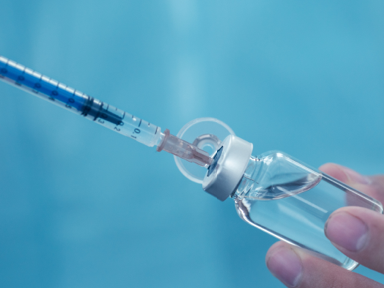firstwordpharmaJune 15, 2021
Tag: COVID-19 , vaccine , NVX-CoV2373
Novavax, Inc. (Nasdaq: NVAX), a biotechnology company developing next-generation vaccines for serious infectious diseases, today announced data from the first co-administration study of a SARS-CoV-2 vaccine candidate [Novavax, NVX-CoV2373] and an approved influenza vaccine [Seqirus, adjuvanted, trivalent seasonal influenza vaccine (aTIV) or a cell-based, quadrivalent seasonal influenza vaccine (QIVc)]. The findings suggest simultaneous vaccination may be a viable immunization strategy. In addition, the protection afforded by the candidate vaccine was consistent with the main study at 87.5% and 89.8% respectively. A preprint of the manuscript, 'Safety, Immunogenicity, and Efficacy of a COVID-19 Vaccine (NVX-CoV2373) Co-administered With Seasonal Influenza Vaccines,' is available at medRxiv.org and has been submitted for peer-review.

As part of Novavax' Phase 3 clinical trial of NVX-CoV2373, its recombinant nanoparticle protein-based COVID-19 vaccine candidate, in the United Kingdom, 431 volunteers were also enrolled in a co-administration sub-study, led by researchers at St George's, University of London and St George's Hospital, London. All received an approved seasonal influenza vaccine with approximately half the participants co-vaccinated with NVX-CoV2373 while the remainder received placebo. The study demonstrated that vaccine efficacy appeared to be preserved in those receiving both vaccines compared to those vaccinated with NVX-CoV2373 alone.
"As the next influenza season approaches and people still need a primary COVID-19 vaccine series or a booster, separate healthcare visits to cover both COVID-19 and influenza vaccinations will be burdensome," said Gregory M. Glenn, M.D., President of Research and Development, Novavax. "As the first clinical study to evaluate safety, immunogenicity, and efficacy of a COVID-19 vaccine when co-administered with a seasonal influenza vaccine, these results demonstrate the promising opportunity for concomitant vaccination, which may improve the uptake of both vaccines."
Local and systemic reactogenicity was largely absent or mild in all groups with only a few events such as pain and tenderness at the injection site and muscle aches being elevated in those co-vaccinated. Local events generally lasted 1-2 days, while systemic events lasted approximately one day for both the co-vaccinated group and the group that received only NVX-CoV2373. In addition to reactogenicity, participants were monitoring for unsolicited adverse events (AEs), medically attended AEs (MAAEs), and serious AEs (SAEs).
Rates of severe events were low in all groups and there were no additional early safety concerns associated with co-administration. Rates of unsolicited AEs, MAAEs, and SAEs were low and balanced between the groups.
"This study shows how important it is to assess the safety profile and immune responses when COVID-19 and influenza vaccines are administered at the same time," said Professor Paul Heath, FRCPCH, Vaccine Institute, St George's, University of London and St George's Hospital, London, who is chief investigator of the Novavax United Kingdom trial. "The results are reassuring and we are excited by the possibility of concomitant use of these vaccines as an important tool in the fight against both of these important respiratory viruses."
Furthermore, immunogenicity of the influenza vaccine was preserved with concomitant administration while a modest decrease in the immunogenicity of the NVX-CoV2373 vaccine was found. Vaccine efficacy in the sub-study was 87.5% (95% CI: -0.2, 98.4) while efficacy in the main study was 89.8% (95% CI: 79.7, 95.5) against SARS-CoV-2. Despite the decrease in the immunogenicity with concomitant vaccination, anti-Spike antibody levels were more than 3-fold higher than levels found in convalescent serum in those who received both vaccines.
"These data could be used to help inform guidance or recommendations on the co-administration of influenza and COVID-19 vaccines, overcoming challenges and contributing towards a new normal to protect at-risk populations from both infections," said Raja Rajaram, M.D., Medical Affairs Lead, EMEA, Seqirus, a co-author of the study. "Seqirus is committed to advancing the science underpinning influenza and taking our place on the front line, alongside our public health partners, as a reliable influenza vaccine supplier."
NVX-CoV2373 is a protein-based vaccine candidate engineered from the genetic sequence of the first strain of SARS-CoV-2, the virus that causes COVID-19 disease. NVX-CoV2373 was created using Novavax' recombinant nanoparticle technology to generate antigen derived from the coronavirus spike (S) protein and is adjuvanted with Novavax' patented saponin-based Matrix-M™ to enhance the immune response and stimulate high levels of neutralizing antibodies. NVX-CoV2373 contains purified protein antigen and can neither replicate, nor can it cause COVID-19. In preclinical studies, NVX-CoV2373 induced antibodies that blocked the binding of spike protein to cellular receptors and provided protection from infection and disease. It was generally well-tolerated and elicited robust antibody response in Phase 1/2 clinical testing.


Contact Us
Tel: (+86) 400 610 1188
WhatsApp/Telegram/Wechat: +86 13621645194
+86 15021993094
Follow Us:




 Pharma Sources Insight July 2025
Pharma Sources Insight July 2025


